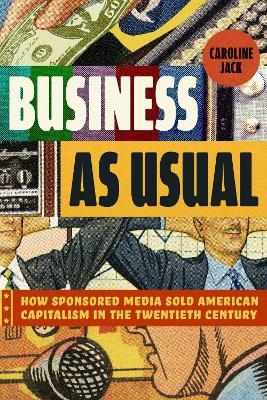
Business as Usual
How Sponsored Media Sold American Capitalism in the Twentieth Century
Seiten
2024
University of Chicago Press (Verlag)
978-0-226-83512-9 (ISBN)
University of Chicago Press (Verlag)
978-0-226-83512-9 (ISBN)
How corporations used mass media to teach Americans that capitalism was natural and patriotic, exposing the porous line between propaganda and public service.
Business as Usual reveals how American capitalism has been promoted in the most ephemeral of materials: public service announcements, pamphlets, educational films, and games—what Caroline Jack calls “sponsored economic education media.” These items, which were funded by corporations and trade groups who aimed to “sell America to Americans,” found their way into communities, classrooms, and workplaces, and onto the airwaves, where they promoted ideals of “free enterprise” under the cloaks of public service and civic education. They offered an idealized vision of US industrial development as a source of patriotic optimism, framed business management imperatives as economic principles, and conflated the privileges granted to corporations by the law with foundational political rights held by individuals. This rhetoric remains dominant—a harbinger of the power of disinformation that so besets us today. Jack reveals the funding, production, and distribution that together entrenched a particular vision of corporate responsibility—and, in the process, shut out other hierarchies of value and common care.
Business as Usual reveals how American capitalism has been promoted in the most ephemeral of materials: public service announcements, pamphlets, educational films, and games—what Caroline Jack calls “sponsored economic education media.” These items, which were funded by corporations and trade groups who aimed to “sell America to Americans,” found their way into communities, classrooms, and workplaces, and onto the airwaves, where they promoted ideals of “free enterprise” under the cloaks of public service and civic education. They offered an idealized vision of US industrial development as a source of patriotic optimism, framed business management imperatives as economic principles, and conflated the privileges granted to corporations by the law with foundational political rights held by individuals. This rhetoric remains dominant—a harbinger of the power of disinformation that so besets us today. Jack reveals the funding, production, and distribution that together entrenched a particular vision of corporate responsibility—and, in the process, shut out other hierarchies of value and common care.
Caroline Jack is assistant professor of communication at the University of California, San Diego.
Introduction: Left to Perish in Debris
Chapter 1: The Contradictions of Economic Education
Chapter 2: Selling America to Americans
Chapter 3: Expertise and Affirmation
Chapter 4: The Great Free Enterprise Campaign
Chapter 5: The New Economics
Chapter 6: From Institutions to Markets
Chapter 7: The Triumphs of Economic Education
Conclusion
Acknowledgments
Notes
Index
| Erscheinungsdatum | 18.09.2024 |
|---|---|
| Zusatzinfo | 18 halftones |
| Sprache | englisch |
| Maße | 152 x 229 mm |
| Gewicht | 513 g |
| Themenwelt | Geisteswissenschaften ► Geschichte ► Regional- / Ländergeschichte |
| Geschichte ► Teilgebiete der Geschichte ► Wirtschaftsgeschichte | |
| Sozialwissenschaften ► Kommunikation / Medien ► Medienwissenschaft | |
| ISBN-10 | 0-226-83512-X / 022683512X |
| ISBN-13 | 978-0-226-83512-9 / 9780226835129 |
| Zustand | Neuware |
| Informationen gemäß Produktsicherheitsverordnung (GPSR) | |
| Haben Sie eine Frage zum Produkt? |
Mehr entdecken
aus dem Bereich
aus dem Bereich
Macht und Herrschaft im Zarenreich
Buch | Hardcover (2024)
C.H.Beck (Verlag)
49,90 €
wie die USA und China um die technologische Vorherrschaft auf der …
Buch | Hardcover (2023)
Rowohlt (Verlag)
30,00 €


